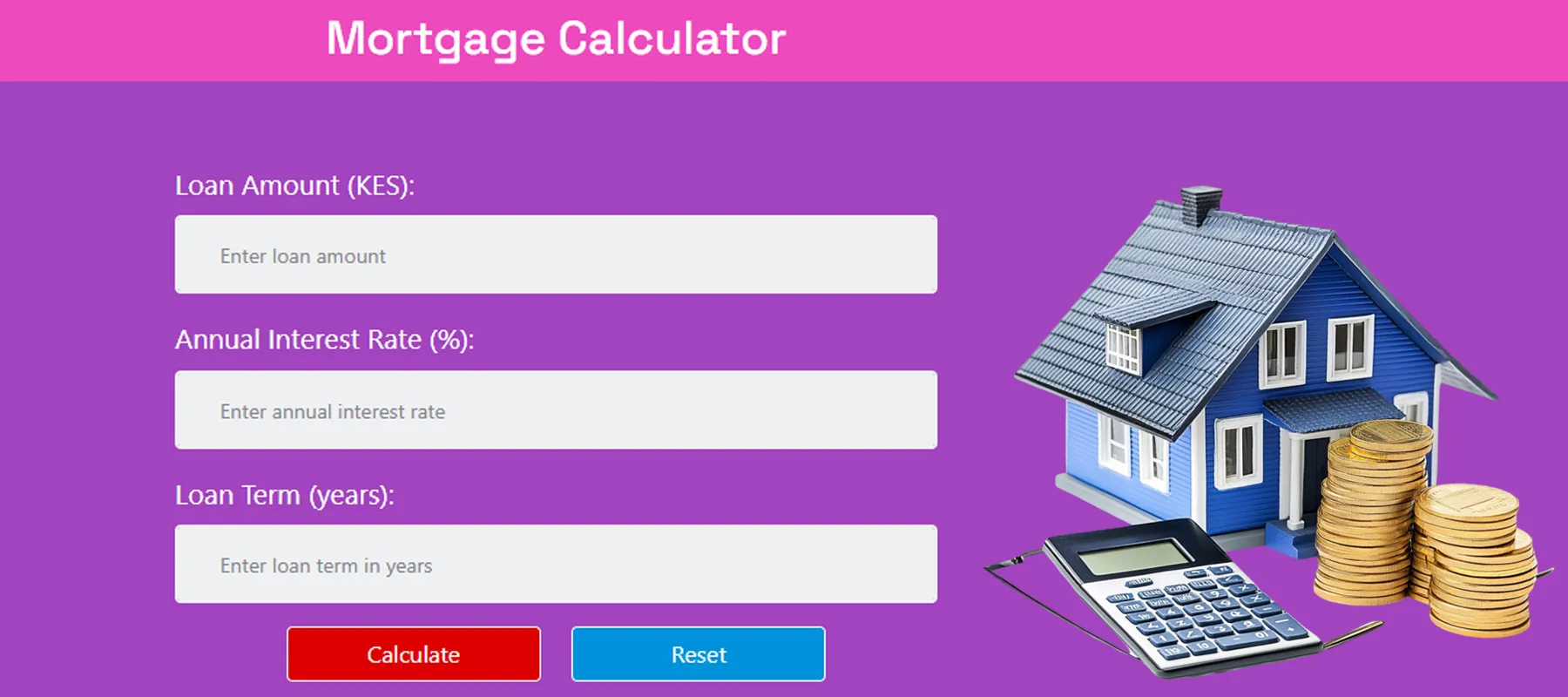1: How do I calculate my monthly mortgage payment?
To calculate your monthly mortgage payment, use this formula:
Monthly Payment=[P×r×(1+r)^n]/ [(1+r)^n–1]
Where:
- P = loan amount (principal)
- r = monthly interest rate (annual interest rate ÷12÷100)
- n = total number of monthly payments (loan term in years ×12)
Example:
If your loan is $200,000, interest rate is 5% annually, and loan term is 30 years:
r=5÷12÷100=0.004167
n=30×12=360
Monthly Payment=[(1+0.004167)360–1][200000×0.004167×(1+0.004167)360]≈$1,073.64 (approx.)
You can easily determine this with a mortgage calculator online. Reputable sites like NerdWallet, Bankrate, and Calculator.net offer excellent tools. For a comprehensive home loan mortgage calculator and other financial tools, visit Serrari Group.
Push boundaries, reach goals, achieve more. Whether it’s ACCA, HESI A2, ATI TEAS 7, HESI EXIT, NCLEX-RN, NCLEX-PN, or Financial Literacy, we’ve got the course to match your ambition. Start with Serrari Ed now.
2: What is the difference between principal and interest in a mortgage?
Principal is the original amount you borrowed. Interest is the cost you pay to borrow that money, calculated as a percentage of the remaining loan balance.
Each monthly mortgage payment includes:
- A portion that goes toward paying down the principal
- A portion that covers the interest cost
In the early years of a mortgage, most of your payment goes to interest. Over time, a larger portion reduces the principal. A mortgage calculator often provides a breakdown of these components.
3: How do I calculate the total interest paid on a mortgage?

Total Interest = (Monthly Payment × Total Number of Payments) – Loan Amount
Example:
From FAQ 1:
Monthly Payment = $1,073.64
Total payments = 360 months
Loan = $200,000
Total Interest = (1,073.64×360)–200,000
=386,510.40–200,000
=$186,510.40
This is the interest paid over 30 years. Many mortgage calculator tools will automatically display this total interest amount.
4: How do extra payments affect my mortgage?
Extra payments reduce the principal faster, which:
- Decreases total interest paid
- Shortens the loan term
Example:
If you pay an extra $100/month on a 30-year, $200,000 mortgage at 5%, you could save over $30,000 in interest and cut about 4–5 years off the loan.
Most mortgage calculator tools allow you to add extra payments to see the effect, providing a valuable mortgage simulation.
5: What is an amortization schedule and how is it used?
An amortization schedule is a table showing:
- Each monthly payment
- The portion going to interest
- The portion going to principal
- The remaining loan balance after each payment
It helps you:
- Track your payoff progress
- Understand how your payments are allocated
- Plan for refinancing or prepayment
Most mortgage calculator tools automatically generate this when you enter your loan info, making it a useful mtg calculator feature.
Fuel your success with knowledge that matters. Enroll in career-defining programs: ACCA, HESI A2, ATI TEAS 7, HESI EXIT, NCLEX-RN, NCLEX-PN, and Financial Literacy. Join Serrari Ed now and take control of your future.
6: How do property taxes and insurance affect my mortgage payment?

Your total monthly mortgage payment often includes more than just principal and interest. It may also include:
- Property Taxes
- Homeowner’s Insurance
- Private Mortgage Insurance (PMI) (if required)
This full payment is called PITI:
Principal + Interest + Taxes + Insurance
Example:
Principal & Interest = $1,073.64
Property Tax = $200/month
Insurance = $100/month
Total monthly payment = $1,073.64 + $200 + $100 = $1,373.64
Most lenders collect these extra costs in escrow. Many advanced home loan mortgage calculator tools allow you to include these figures for a more accurate total payment estimate.
7: How much mortgage can I afford based on my income?
A general rule is:
Your total housing costs should not exceed 28% of your gross monthly income.
Use this formula:
Maximum Affordable Payment = Monthly Income × 0.28
Example:
If your gross monthly income is $5,000:
$5,000×0.28=$1,400
You should aim for a mortgage (including taxes and insurance) around $1,400/month. This is a common calculation performed by a mortgage estimator or mtg calc tool.
8: What is PMI and when do I have to pay it?
PMI (Private Mortgage Insurance) is required when your down payment is less than 20% of the home’s price.
- It protects the lender if you default.
- It’s added to your monthly payment.
Example:
If you buy a $300,000 home with a 10% down payment ($30,000), you’ll likely pay PMI.
PMI typically costs 0.5% to 1.5% of the loan per year.
If your loan is $270,000:
PMI at 1% = $2,700/year = $225/month
Once your equity reaches 20%, PMI can often be canceled. Some advanced mortgage calculator tools can factor in PMI.
9: How is the mortgage interest rate calculated?

The interest rate is set by the lender and influenced by:
- Your credit score
- Loan type and term
- Market rates
- Down payment size
You do not calculate the rate yourself — but you use it in the mortgage formula.
To find the monthly rate, divide the annual rate by 12:
Example:
Annual rate = 6%
Monthly rate = 6÷12=0.5%, or 0.005 in mortgage calculator formulas.
10: How do I compare mortgage offers from different lenders?
Look beyond just the interest rate. Compare:
- APR (Annual Percentage Rate) – includes fees and gives a better idea of total cost
- Monthly payment
- Upfront fees (origination, closing costs)
- Loan terms (e.g., 15 vs 30 years)
- Total interest paid over time
Use a mortgage calculator for each offer by plugging in:
- Loan amount
- Interest rate
- Loan term
This helps you clearly see which offer is cheapest long-term and provides a useful mortgage simulation for your financial planning.
Ready to take your career to the next level? Join our dynamic courses: ACCA, HESI A2, ATI TEAS 7 , HESI EXIT , NCLEX – RN and NCLEX – PN, Financial Literacy!🌟 Dive into a world of opportunities and empower yourself for success. Explore more at Serrari Ed and start your exciting journey today! ✨
















